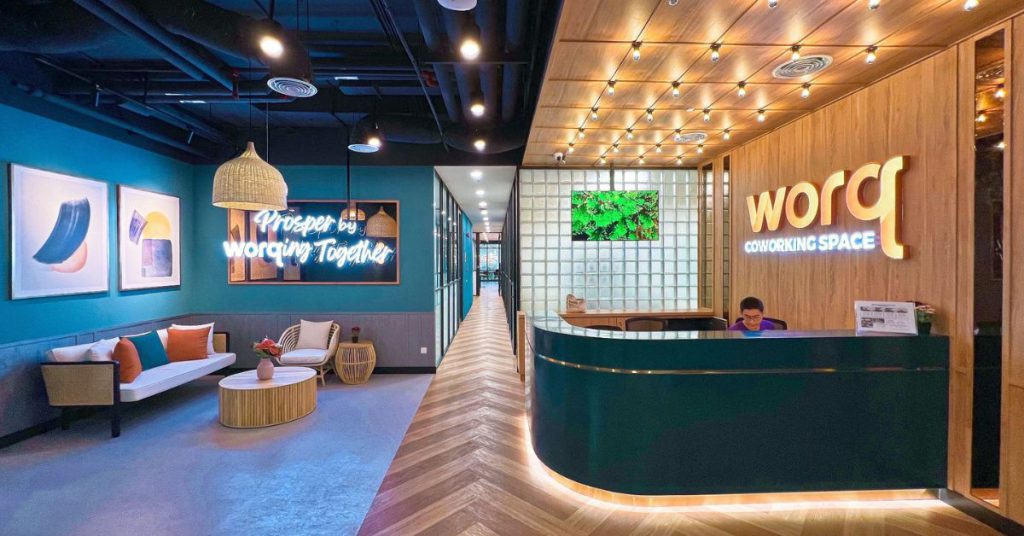M’sian coworking space startups share what WeWork’s bankruptcy means for the local scene
Following WeWork's bankruptcy, we spoke to Malaysian coworking startups WORQ and Colony on how that might impact the local scene.

On November 6, American coworking giant WeWork filed for Chapter 11 bankruptcy protection, listing US$18.6 billion’s worth of debt.
It had once been among the most valuable startups in the United States and even the world, with a valuation of US$47 billion.
In 2019, though, during an attempt to go public, the company found itself embroiled with drama and controversies, particularly surrounding co-founder and CEO Adam Neumann. Its valuation tanked, the IPO was delayed, and the company was taken over by its biggest investor, SoftBank, a report by CNBC relayed.
WeWork’s crash had ended up affecting the rest of the coworking industry, sowing distrust amongst investors. So, now that the coworking space has filed for bankruptcy, what does it mean for the industry, particularly the one in Malaysia?
To understand the local sentiments, we spoke to two homegrown and well-established coworking space players, WORQ and Colony.
Why WeWork matters
For those who have not really heard of WeWork, you might wonder why this is a big deal for the industry.
“I think WeWork has had a very huge effect on the coworking space industry, it really shaped the way coworking spaces today exist,” said Timothy Tiah (Tim), the CEO of Colony.
Not only did it popularise the concept with customers, Tim said, it also helped coworking startups foster trust and raise capital from investors.
WORQ’s CEO Stephanie Ping shared, “There is no denying that WeWork pioneered the modern coworking industry, spurring the global adoption of flexible offices. They offered cool Google-like offices everywhere and made them available on a shared basis.”
 One of WeWork’s offices / Image Credit: WeWork
One of WeWork’s offices / Image Credit: WeWorkIn fact, WORQ itself was inspired by WeWork in the early days as they were setting out to create a localised product, Stephanie said.
That said, WeWork isn’t the only example of a coworking startup that’s made it big globally.
“IWG (Regus), Servcorp, and many of these other players have existed as a profitable business model for many many years, they’ve proven that the model works,” Timothy said. “It’s just that, you kind of have to run it properly.”
By this, Timothy means that companies can’t just raise a huge chunk of money and deploy it all, or take whatever real estate deals they can to rapidly scale. Rather, he believes coworking startups will still need to scale slowly and intentionally like a proper business.
“Not all the real estate deals that are worth going into are available, right in this quarter, right in this year,” he elaborated.
So, what does it mean for local players?
For both WORQ and Colony, WeWork’s bankruptcy isn’t necessarily a cause of concern. This is because both startups said they have been profit-driven all this while.
However, just because both of these startups are profitable doesn’t mean that this is natural for most coworking startups.
Timothy explained, “The thing about coworking spaces is that most find it tough to make money. I think part of it is because WeWork popularised the concept, and when WeWork started, a lot of people raised money hoping to be the next WeWork or to be acquired by WeWork.”
According to the founder, this ended up flooding the coworking space market. With the rise of competition, the unit economic began to be disrupted. So, for many coworking spaces, their business models became one that was very hard to make money from.
 One of Colony’s luxury coworking spaces / Image Credit: Colony
One of Colony’s luxury coworking spaces / Image Credit: ColonyHowever, with the past few years, what with the pandemic and WeWork blowing up in 2019 (as well as funding drying up, Timothy added), positive unit economics are returning.
Timothy also shared that the industry is consolidating where there are less and less players. Thus, there is less competition, but demand is growing.
“At the start, WeWork adopted a growth-at-all-costs approach, emphasising revenue growth over profits,” Stephanie added.
While she agrees that this is one way to approach the business, WORQ has taken a different approach since its inception, whereby they prioritise sustainable growth, ensuring that each location operates profitably to enable reinvestment and expansion.
“The developments at WeWork are a reminder that financial discipline is paramount in scaling a business and we must adapt to customer needs,” Stephanie said.
What this means for funding and investors
When asked about how this may affect funding, Timothy said, “I think the sentiment has been really bad since three years ago, four years ago, when WeWork first blew up.”
“So, I think it’s very hard to raise money unless you’re willing to take a very low valuation. The market valuation right now is not very promising to raise money.”
As such, it becomes even more critical for companies like Colony to focus on sustainability and profits.
“We’re profitable not just on EBITDA basis, not just on a centre basis but on a group level, even on a net profit basis,” Timothy said. “As long as we keep up our numbers, keep showing that we are generating cash, which we are so far, touch wood, I think our investors should be okay with that.”
Similarly, WORQ’s founder believes that the bankruptcy symbolically represents the end of the “growth at all cost, scaling first, profit last” era—a lesson that applies not only to coworking spaces but to startups worldwide.
 WORQ’s cofounders recently shared about how their startup prioritises profitability during a panel / Image Credit: Vulcan Post
WORQ’s cofounders recently shared about how their startup prioritises profitability during a panel / Image Credit: Vulcan PostWhen it comes to funding, Stephanie believes that only companies operating with high efficiency and strong governance will gain investor trust.
“The lesson here is to not succumb to the pressures of the market. Even though funding was readily available, and every startup was racing to grow at all costs, it is our fiduciary duty as investee companies to be good stewards and to do the right thing, even if the market is in a frenzy,” she said.
“FOMO (fear of missing out) is real in investment and business, and we must always remain sturdy and fight that urge so we can steadily execute our plan and vision to the end.”
According to Stephanie, some in the investing community have told WORQ that WeWork’s announcement may very well create a void in the industry to be filled, perhaps, by the next strongest player.
WeWork’s future in Malaysia
For now, WeWork’s bankruptcy announcement is just for the US and Canada.
Plus, as Timothy pointed out, even if a company goes bankrupt, its business is still operationally running. It just means there’ll be a restructure with liquidators involved.
“I don’t think from a customer perspective you’ll be threatened,” Timothy said. “Though there is a risk that [if] they can’t restructure properly, they might just shut down everything. But as a client, what you may lose is just deposits.”
In any case, Timothy doesn’t think it will have much of a ripple effect in Malaysia, as WeWork’s presence in Malaysia isn’t that big. It only has two outlets locally, one in Mercu 2 and one in Equatorial Plaza.
Calling WeWork’s contact number in Malaysia, we were able to learn that both locations are still operating as usual.
But as Stephanie put it, “Nevertheless, there may still be some parties who feel jittery about the announcement despite WeWork’s assurance that the business remains open, operational, and [is] fulfilling its commitments.”
With that in mind, Stephanie believes that stakeholders, including landlords and customers, may want to explore options ahead of time, though it remains to be seen whether a ripple effect will take place.
In fact, the WORQ CEO revealed that they have received some inquiries from WeWork members who are looking at alternative options.
She said, “This is part and parcel of market trends because offices form an integral infrastructure of business operations and for business continuity purposes, companies will naturally plan their risk management as they see fit.”
 One of WORQ’s coworking spaces / Image Credit: WORQ
One of WORQ’s coworking spaces / Image Credit: WORQWith everything said and done, WeWork’s rise and falls seem to be laden with lessons that entrepreneurs can take cues from, especially entrepreneurs in the coworking space. Despite its crash, it has inspired many startups in the space, WORQ and Colony included.
“We want to take this opportunity to thank WeWork for setting the stage around the world and including the hard work our colleagues have done with the Malaysia locations,” Stephanie said.
She continued, “Like any industry in its early stages, growing pains are inevitable. Whether it’s ecommerce or social media, they all have experienced their respective growth cycles, evolving from infancy to maturity. As each industry expands, numerous players enter to experiment with their business models and products. Some will thrive, some will remain, and others will exit.”
Perhaps WeWork’s bankruptcy is not so much a symbol of a declining business model, but the beginnings of a new chapter for the coworking space industry.
Learn more about Colony here. Learn more about WORQ here. Read other articles we’ve written about coworking spaces here.Featured Image Credit: Stephanie Ping, WORQ’s CEO / Timothy Tiah, Colony’s CEO

 FrankLin
FrankLin 
































